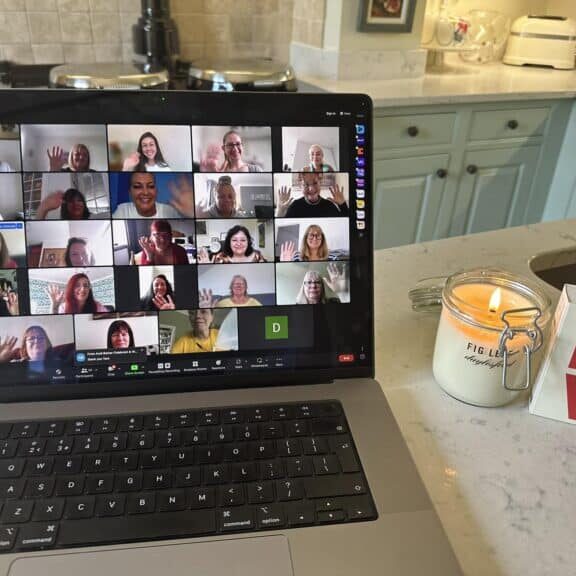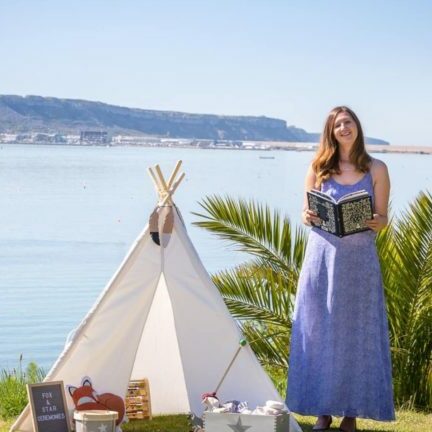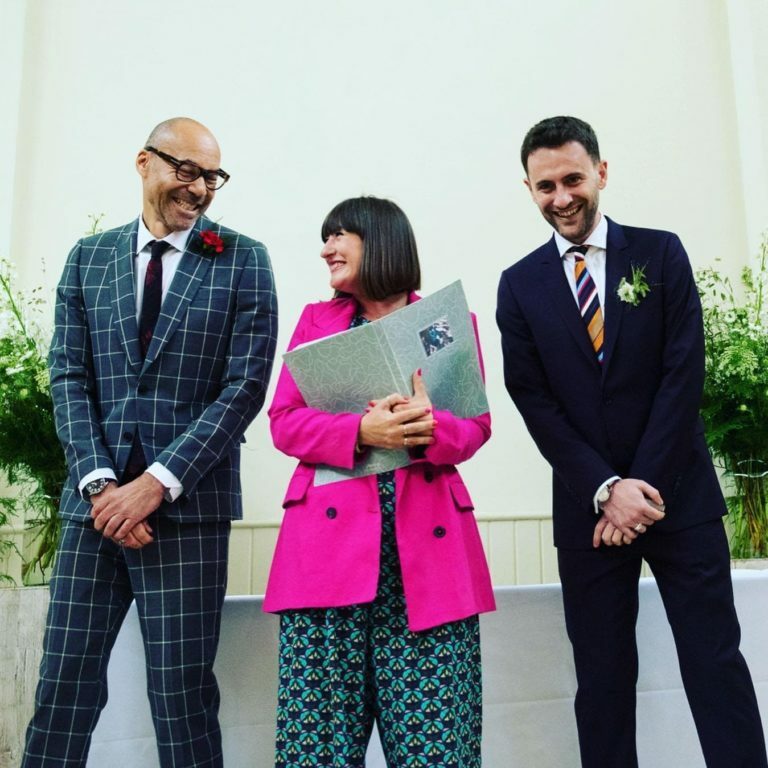As celebrants, we sure do love to write ceremony scripts! It’s the best part of the job! There are several aspects to the job of celebrant that can be tricky to master, from mustering the bravery to stand up and speak in public to finding the right tone and formality with which to speak to your couple.
Writing a wedding ceremony script is another of these aspects that takes time to master, but with our helpful tips, you can start crafting beautiful ceremony scripts for your ceremonies right now.
Writing a wedding ceremony script
Writing a compelling, meaningful wedding ceremony script is one of the most important skills you can develop as a wedding celebrant. The ceremony sets the tone for the couple’s wedding day and marriage. An impactful, personalized ceremony requires thoughtful crafting that brings your couple’s love story to life.
This comprehensive guide will cover the essentials of writing an unforgettable wedding ceremony, from understanding what couples want most to incorporate special details that reflect their relationship. You’ll learn ceremonies should focus on quality over quantity when it comes to content length. We’ll also explore finding inspiration as you hone your abilities to blend heartfelt emotions with authentic delivery tailored to each unique couple.
What makes a wedding ceremony script great?
Mastering the art of creating a meaningful and memorable wedding ceremony script is what separates the good from the great when it comes to being a Wedding Celebrant. It enables you to create bespoke experiences that resonate powerfully with all those present.
A great wedding ceremony script should be thoughtful, memorable and remarkable. It needs to be written with care and insight and should leave people feeling that they know the couple better for having been there.
If done thoughtfully, you can balance time-honoured traditions and modern sentiments to produce one-of-a-kind wedding ceremonies. Let’s explore some best practices for writing unforgettable scripts!

What do officiants say at weddings?
The first thing you might ask yourself is: What exactly does an officiant or celebrant say during a wedding?
Clearly, a lot depends on the couple you’re talking about – you’ll want to dedicate a decent amount of time to tell the couple’s love story: how they met, what their first date was like, how the proposal went down, etc. There may be opportunities for family members to come to the front and share stories, poems, or readings pertinent to the couple’s relationship; alternatively, you may be asked to read these yourself.
If the couple has decided to include special ceremony elements such as a hand-fasting or a unity sand ceremony, you’ll need to prepare some symbolic words to go with the actions being performed as well.
Most importantly, of course, you’ll need to find some words for the ring exchange and the pronouncement – although because celebrants aren’t allowed to conduct legal ceremonies (yet!), it is advised to stay away from the words “I now pronounce you husband and wife.
Read More: A pocket guide to becoming a wedding celebrant

Understanding what couples want
Before you start writing a wedding ceremony script, it’s important to understand that most couples want the same few basic things from their wedding ceremony:
- Exchanging vows
- Exchanging rings
- Sharing a kiss
- Having a first dance
- Celebrating with loved ones
As a celebrant, your role is to transform the ceremony into a memorable celebration. As Master of Ceremony Adam Straney says, “Celebrants do the party before the big party.” You set the tone and build excitement for the reception ahead.
Understand that beyond the basic wedding ceremony flow; each couple envisions the event uniquely depending on their preferences and vision for the day. Some may want it to be funny; some may prefer a more formal occasion. One essential celebrant skill is adapting your ceremony scripts based on the desires your couples express during your sessions together to give them the ceremony of their dreams.
How do you write a wedding ceremony script?
While everyone writes their wedding ceremony script differently, here are a few pointers as to how you might want to go about it:
- Meet the couple, get to know them, and find out what they want to include in the ceremony.
- Plan the structure of the ceremony before you start writing it, to get a feel for the flow, and how everything ought to fit together.
- Write the personal parts of the ceremony first, such as the couple’s story.
- Put together the words you’ll need for any ceremony elements, such as the hand-fasting or the unity sand ceremony.
- Put all the ceremony pieces together into a full document, including any poems or readings that will be read.
- Link everything together with ‘intros’ and ‘outros’, such as thanking people for the reading they’ve given or introducing pieces of music.
- Check everything through visually for any inconsistencies or typos.
- Read the ceremony aloud at least once to get a feel for how it sounds, and make any edits where necessary.
Conveying authenticity as a celebrant: Be yourself
When you’re writing a ceremony script, it obviously has to reflect the couple, but it is also a reflection of your style as a celebrant, so stay true to your style. Tailor metaphors and descriptors to their unique essence, but tell their love story in a way that feels natural to you:
- Avoid over-formality or stale cliches about love/marriage.
- Don’t try and force yourself to be funny if it’s not your style
- Remember your couple chose YOU for a reason; do what you do best and be yourself.
You can take creative license in presenting their story as a poem, fable, or prose, you could even rap it if that’s your style, what’s most important is that you deliver the ceremony in your own authentic style.
Establishing your ceremony niche
It will help you to define your own style and niche as a Celebrant. Once you have a clear style, it’s easier to build a library of references, common phrases, quotes, inspiration, etc, to pull from when writing your ceremonies.
Beyond your innate style, identify 2-3 speciality ceremony types to develop niche expertise:
- Traditional Elegance
- Spiritual
- Heartfelt and sentimental
- Relaxed
- Fun
- Outgoing
- Funny
- Quirky
- Poetic & romantic
- Sweet & tender
- Poetic Verse
Is your style your only niche? Do you specialize in Interfaith or LGBTQ+ ceremonies? How do you infuse that into your ceremonies?
Time-Saving Tip: Note common themes and go-to phrasing to incorporate for each niche when drafting your wedding ceremony script.
We go into all this and more in-depth in our Accredited Wedding Celebrant Training programme
How long should a wedding ceremony script be?
This question depends on how long the couple expects the ceremony to take. A very basic wedding ceremony will take a minimum of 15 minutes, although many might feel a little short-changed if it’s that short. 20-30 minutes is fairly standard, but if it’s an elaborate ceremony with many different elements, several contributions from friends and/or family, and multiple pieces of music, it can last up to an hour or more. If you know how long the ceremony should be, reading the script aloud after you’ve finished will give you an idea as to whether you need to add or remove any content.

Prioritize quality over quantity.
When you’re writing the love story part of the ceremony, include interesting insights that give people a sense of who they are as a couple, but keep it short and snappy; more than 5-8 minutes is too long, and people will lose interest. Remember, you’ve still got the vows and the ring exchange to do.
Focus on concise delivery emphasizing symbolic or romantic anecdotes over lengthy orations about love.
Delivering a short and memorable ceremony is far better than a longer ceremony that loses meaning because everyone’s fallen asleep! Remember, more doesn’t always mean more!
Script writing preparation: Getting to know your couple
Thorough preparation is essential to crafting an amazing bespoke ceremony. At a minimum, you should meet with the couple 2-3 times and have in-depth conversations to truly get to know them.
You need enough intimate details, memories, “inside jokes,” or thoughtful insights to write a ceremony authentically reflect who they are as a couple. Identify their values, history, challenges overcome together, and what they most want to convey through their ceremony. Determine where you fall as a celebrant on the “ceremony scale” in terms of style and align expectations.
Craft insightful questions to capture the essence of their love story accurately:
- How/Where/When did they meet?
- What first attracted them?
- When did they know it was love?
- Why do they complement each other?
Record your meetings and reference back when writing.
We go into all this and more in-depth in our Accredited Wedding Celebrant Training programme
Finding inspiration for wedding ceremony scripts
The Internet offers unlimited inspiration for crafting creative wedding ceremony scripts, from music choices to famous quotes, speeches, film references and nostalgic pop culture elements that resonate with couples. Stay organized by creating Pinterest boards or Evernote notebooks with ideas categorized by style, theme or mood that you can reference later.
Follow celebrity and influencer weddings for of-the-moment trends to incorporate if relevant. Use visuals that spark imaginative ideas you can translate to words for elements like décor, vows or readings.
N.B. Get full access to our celebrant resource library when you train with us. Find out more about our Accredited Wedding Celebrant Training programme
Wedding ceremony outline
Not all wedding ceremonies will follow the same set flow. In fact, one of the best things about being an independent celebrant is that you can throw the rulebook out of the window!
That said, it can be helpful to keep the standard ceremony stages in mind when you’re planning your script and adjust based on traditions and preferences. Use this outline to start to map out your ceremony script. Remember, ceremony scripts should be individual to the couple; however, this is a great starting point to help craft your ideal ceremony.
- Processional (walking down the aisle)
- Welcoming Remarks and Introduction to the wedding ceremony
- Readings & Music
- Couple’s love story
- Vows
- Symbolic Rituals Inclusion of something symbolic like a hand-fasting or sand ceremony
- Ring exchange
- Kiss
- Pronouncement
- Aisle and confetti walk (recessional)
Use this outline as a flexible template to build upon with your authentic voice and key details about the couple.
FAQ: Should the Couple Write Their Own Vows?
This is totally down to what you agree with the couple themselves, and it can usually go one of three ways:
- The couple will write their own vows completely themselves without any input from you.
- The couple will write their own vows and ask you to cast your expert eye over them to ensure they flow nicely.
- The couple will ask you to write the vows entirely yourself, though they’ll likely want to read through them before the ceremony.
Whichever of these three options you agree upon, it’s highly recommended for the celebrant to have a copy of the vows in their script, just in case!
Check out The Celebrant Directory’s guide to writing your own wedding vows and personalising the ceremony, always a good resource to help your couples!

FAQ: Should a Wedding Ceremony Script Include Religious Elements?
Again, this totally depends on what the couple wants. More and more couples are agnostic or come from mixed-faith backgrounds these days, so often they won’t want any religious elements in the ceremony so as not to make either bride or groom uncomfortable.
The best thing about being an independent Celebrant is that you are flexible and have the freedom to include and infuse any elements that couples may want, regardless of its religious significance or origin, so if the couple does request a religious hymn, poem, reading, or anything else, you can include it in the ceremony.
Wedding ceremony script examples
Here are a few examples of texts you might like to use at various moments of the ceremony:
Welcome
- “Welcome to the most important day in the lives of Max and Evelyn.”
- “Today, we are brought together by the most wonderful, natural and sometimes most confusing thing in the world – love!”
- “Welcome, family and friends, to the party we’ve all been waiting for!”
Vows
- “Max, I promise that I will respect you as an individual, support you through difficult times, rejoice with you through happy times, be loyal to you always, and, above all, love you as my husband and friend.”
- “Evelyn, I vow to always turn the football off when you have something important to say, I vow to never watch any episodes of Friends without you, and I vow to always put the toilet seat down.”
Ring Exchange
- “Max, I give you this ring as a sign of my undying love for you, from this day until the end of time.”
- “Evelyn, with this ring, we forge a new path on our adventure together. I love you, always, as my best friend.”
Closing statement
- “May you have many joys, and be the light of each other’s days. May all that you are, always be in love; and may all that is love, always be in you.”
End on an Uplifting Note
Finish the ceremony on a high. Remember it needs to be fun memorable, and remarkable.
Write the ceremony with love, care and attention to detail with thoughtful insights about the couple and ask someone else to read or listen to the ceremony before you deliver it, to make sure you’ve got the key details in.
Conclude with a powerful, optimistic summary conveying excitement about the new chapter the couple are embarking on together. Re-emphasize their commitment and unwavering bond. This impactful closing momentum carries through the remainder of the wedding.
Want to learn how to write the perfect ceremony script?
We teach this and so much more inside our celebrant training programme. Find out more here
Jennifer Claire
Jennifer is the Director of the leading celebrant training company, The Academy of Modern Celebrancy as well as the Founder of The Celebrant Directory, supporting over 600 celebrants globally.
Jennifer run a 2.5k community of celebrants who she dedicates her time to helping them grow their businesses and taking celebrancy from a hobby to a lifestyle.
Jennifer heads up the global Celebrant Industry Awards and the global celebrant summit, Celebrantopia each year!
A celebrant herself since 2010, she knows what it takes to make it in the industry and trains the best celebrants out there across the UK, Europe and the USA.
Take the Quiz to find out if you have what it takes!
Download the Ultimate Guide to becoming a Celebrant & find out how you can make this happen!

If you liked this article you may enjoy ...
Celebrant Training – A Complete Guide
Embarking on celebrant training is a journey into crafting and leading personalized ceremonies that mark life’s significant moments. This Celebrant Training guide delves into the essence of celebrant training, highlighting the blend of practical skills and business knowledge essential for thriving in this unique profession. Whether you’re drawn to weddings, funerals, or naming ceremonies, the…
Innovative Naming Ceremony Ideas for Celebrants
Naming ceremonies, a tradition steeped in history across cultures, offer a momentous way to welcome a child. Family or Naming Celebrants play a key role in infusing these ceremonies with meaning, tradition, and personal touches. Naming ceremonies, an age-old tradition to welcome a new member into the family and community, are experiencing a transformation. As…
What should I look for in a Celebrant training programme?
Choosing a celebrant training programme is an important step if you’re looking to become a professional celebrant, whether it’s for weddings, funerals, or other ceremonies. Here are key factors to consider when selecting a celebrant training programme: Accreditation and Recognition: Recognition by professional bodies assures you and potential clients that the training has met established…
As featured in










